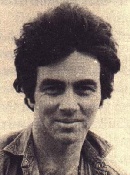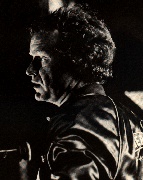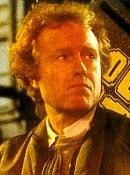Paul M. Sammon Interview
| What is BR? |
| News & Views |
| The FAQ |
| Encyclopedia |
| Quotes |
| People |
| Locations |
| Scripts |
| Analysis |
| Fan-tastic |
| BR Fun |
| BR Game |
| BR Magazine |
| BR Comic |
| Downloads |
| Collectibles |
| Related |
| Links |
| Site Info |
| Search Site |
BRmovie.com is the Home of Blade Runner - the current Blade Runner FAQ, news, resources, links, quotes, scripts and everything else Blade Runner.

![]()
Blade Runner
Buy this Mini Poster at AllPosters.com
|
Any
Comments?
Please e-mail the Webmaster |
| Want the DVD? Or the BR Game? Don't know which books or music to get? Maybe you'd like a Deckard action figure? Make sure you check the BR Related section for all your BR choices. |
|
N: Ridley Scott and Hampton Fancher - two creative minds tugging in different directions. You were witness to some of that - was it only occasional, or all the time? What was it like being the observer? PS: Well, the most intimate moments between Hampton and Ridley took place when they were alone together, spitballing ideas for the rewrites. I wasn't there for that. No one was. I did have the opportunity of seeing them interact a few times during prep, however. And the differences between their personalities was the most immediate observation one came away with.
Now Ridley's a totally different sort of person. Lower-keyed. More guarded. A guy who keeps most of his cards close to his chest. Which isn't to say that Ridley can't be polite or funny or charming, because he can, and I've witnessed all of those qualities. But when he was shooting Blade Runner, Ridley seemed to basically operate in two modes: either as the CEO or commander-in-chief of this somewhat rebellious army - who couldn't, or didn't want to, tune into his wavelength - or as a formidably gifted artist who endlessly agonized over where to precisely place a prop or smoke pot to complete the perfect shot. In fact, sometimes it was a little jarring to watch Ridley switch from this amiable, down-to-earth guy to a pissed-off captain of industry, who'd wasn't above hollering at people to get their shit together. After awhile, though, I came to realize that, given the line of work he's in, this CEO/military commander/artist-in-residence persona Ridley cultivated at the time worked pretty well for him. That was a shrewd, practical way of making his first film in Hollywood, to present himself as a tough, no-bullshit field marshal who also happened to be an enormously talented artist. N: Could you give us an example of Mr. Scott's harder side? PS: Well, on BR, when he was in his Chief of Staff mode, Ridley could be very tough on certain folks, especially the ones he felt weren't displaying the same level of commitment he'd dedicated himself to. He often was quite stern and matter-of-fact; there wasn't a lot of joking going down on the BR set. Yet I don't think Ridley was acting this way just to be an asshole; it was his way of dealing with the circumstances.
So when some people who worked on Blade Runner ask me, "How can you say anything nice about Ridley Scott? The guy was a jerk!", all I can reply is, "Yes, he was. Sometimes. For different reasons. But never to me. That Ridley Scott was always pleasant and helpful and respectful." Twenty years later, he's still that way with me. Why? I still haven't figured that one out. Maybe it was just because I "got" Ridley right away. And stayed out of his way. Or maybe it was due to the fact that we were both tuned to the same wavelength, and understood his frustrations. Besides, I wasn't the only person on that set he got along with. There were others. Although we do seem to have been in the minority… (laughs) N: So where did the tensions between Scott and Fancher come from?
|

 Hampton,
for instance, was the more emotional of the two; he's a bit larger
than life, our Hampton. Slightly flamboyant, and sardonically amusing.
But what saves Fancher from being just another handsome Hollywood
guy is his mind. He's a surprisingly verbal, well-read fellow -
especially for an actor. Fancher has a sincere respect for and knowledge
of serious literature. There's a certain sweetness and humor in
Hampton's character, too. Plus, the writing style he adopted for
Blade Runner was so bizarrely idiosyncratic.
Hampton,
for instance, was the more emotional of the two; he's a bit larger
than life, our Hampton. Slightly flamboyant, and sardonically amusing.
But what saves Fancher from being just another handsome Hollywood
guy is his mind. He's a surprisingly verbal, well-read fellow -
especially for an actor. Fancher has a sincere respect for and knowledge
of serious literature. There's a certain sweetness and humor in
Hampton's character, too. Plus, the writing style he adopted for
Blade Runner was so bizarrely idiosyncratic. For
example, Ridley was under a tremendous amount of pressure from Tandem
Productions, who'd stepped in and taken over the film when Blade
Runner went over budget, and Ridley had a terrible time adjusting
to that. I also don't think he was prepared for the fact that, in
Hollywood, a director will many times have to explain - or justify
- why he wants what he wants. And Ridley's not a talker by nature
- he just wants to get the job done, you know? So that was one condition
he'd never had to operate under before. And the recent death of
his older brother Frank, who'd passed on a couple of years before
Blade Runner was released, was still very much on Ridley's
mind. Then there were the day-to-day frustrations; much of the time,
BR's crew was teetering on the edge of open rebellion, for
any number of reasons. Blade Runner also was the first movie
Scott had shot in the United States for a major studio on a major
studio's lot. And Warners, like all studios, operates under the
aegis of incredibly Byzantine union regulations, some of which fly
so far away from anything approaching reality that they can drive
you totally 'round the bend.
For
example, Ridley was under a tremendous amount of pressure from Tandem
Productions, who'd stepped in and taken over the film when Blade
Runner went over budget, and Ridley had a terrible time adjusting
to that. I also don't think he was prepared for the fact that, in
Hollywood, a director will many times have to explain - or justify
- why he wants what he wants. And Ridley's not a talker by nature
- he just wants to get the job done, you know? So that was one condition
he'd never had to operate under before. And the recent death of
his older brother Frank, who'd passed on a couple of years before
Blade Runner was released, was still very much on Ridley's
mind. Then there were the day-to-day frustrations; much of the time,
BR's crew was teetering on the edge of open rebellion, for
any number of reasons. Blade Runner also was the first movie
Scott had shot in the United States for a major studio on a major
studio's lot. And Warners, like all studios, operates under the
aegis of incredibly Byzantine union regulations, some of which fly
so far away from anything approaching reality that they can drive
you totally 'round the bend. PS:
Conflicting personalities and different levels of experience. I
know Hampton was getting increasingly frustrated with all the rewrites
he did, especially since he felt those revisions were weakening
the Deckard/Rachael romance angle and the ecological themes he'd
originally conceived for his script. Hampton was starting to burn
out a little, too. And he definitely wasn't as aware of the politics
of rewriting as he should have been - I mean, the basic rule of
thumb in this business is, what the director wants, the director
gets. But Hampton would sometimes become angry or sad or confused
by what was going on, and argue with Ridley about this or that.
Meanwhile, Ridley stayed emotionally opaque. Which I'm sure drove
Hampton crazy. But if I communicated anything in Future Noir,
I hope it was the fact that film business can be incredibly demanding
and political and - well, just basically unpleasant! (laughs)
PS:
Conflicting personalities and different levels of experience. I
know Hampton was getting increasingly frustrated with all the rewrites
he did, especially since he felt those revisions were weakening
the Deckard/Rachael romance angle and the ecological themes he'd
originally conceived for his script. Hampton was starting to burn
out a little, too. And he definitely wasn't as aware of the politics
of rewriting as he should have been - I mean, the basic rule of
thumb in this business is, what the director wants, the director
gets. But Hampton would sometimes become angry or sad or confused
by what was going on, and argue with Ridley about this or that.
Meanwhile, Ridley stayed emotionally opaque. Which I'm sure drove
Hampton crazy. But if I communicated anything in Future Noir,
I hope it was the fact that film business can be incredibly demanding
and political and - well, just basically unpleasant! (laughs)